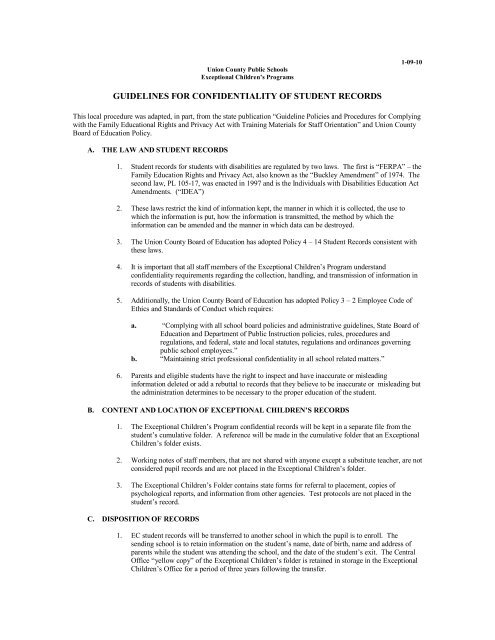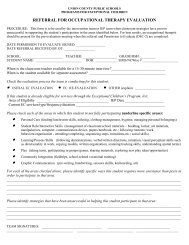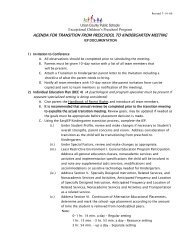Confidentiality of Student Records - UCPS - Exceptional Children ...
Confidentiality of Student Records - UCPS - Exceptional Children ...
Confidentiality of Student Records - UCPS - Exceptional Children ...
Create successful ePaper yourself
Turn your PDF publications into a flip-book with our unique Google optimized e-Paper software.
Union County Public Schools<br />
<strong>Exceptional</strong> <strong>Children</strong>’s Programs<br />
10910<br />
GUIDELINES FOR CONFIDENTIALITY OF STUDENT RECORDS<br />
This local procedure was adapted, in part, from the state publication “Guideline Policies and Procedures for Complying<br />
with the Family Educational Rights and Privacy Act with Training Materials for Staff Orientation” and Union County<br />
Board <strong>of</strong> Education Policy.<br />
A. THE LAW AND STUDENT RECORDS<br />
1. <strong>Student</strong> records for students with disabilities are regulated by two laws. The first is “FERPA” – the<br />
Family Education Rights and Privacy Act, also known as the “Buckley Amendment” <strong>of</strong> 1974. The<br />
second law, PL 10517, was enacted in 1997 and is the Individuals with Disabilities Education Act<br />
Amendments. (“IDEA”)<br />
2. These laws restrict the kind <strong>of</strong> information kept, the manner in which it is collected, the use to<br />
which the information is put, how the information is transmitted, the method by which the<br />
information can be amended and the manner in which data can be destroyed.<br />
3. The Union County Board <strong>of</strong> Education has adopted Policy 4 – 14 <strong>Student</strong> <strong>Records</strong> consistent with<br />
these laws.<br />
4. It is important that all staff members <strong>of</strong> the <strong>Exceptional</strong> <strong>Children</strong>’s Program understand<br />
confidentiality requirements regarding the collection, handling, and transmission <strong>of</strong> information in<br />
records <strong>of</strong> students with disabilities.<br />
5. Additionally, the Union County Board <strong>of</strong> Education has adopted Policy 3 – 2 Employee Code <strong>of</strong><br />
Ethics and Standards <strong>of</strong> Conduct which requires:<br />
a. “Complying with all school board policies and administrative guidelines, State Board <strong>of</strong><br />
Education and Department <strong>of</strong> Public Instruction policies, rules, procedures and<br />
regulations, and federal, state and local statutes, regulations and ordinances governing<br />
public school employees.”<br />
b. “Maintaining strict pr<strong>of</strong>essional confidentiality in all school related matters.”<br />
6. Parents and eligible students have the right to inspect and have inaccurate or misleading<br />
information deleted or add a rebuttal to records that they believe to be inaccurate or misleading but<br />
the administration determines to be necessary to the proper education <strong>of</strong> the student.<br />
B. CONTENT AND LOCATION OF EXCEPTIONAL CHILDREN’S RECORDS<br />
1. The <strong>Exceptional</strong> <strong>Children</strong>’s Program confidential records will be kept in a separate file from the<br />
student’s cumulative folder. A reference will be made in the cumulative folder that an <strong>Exceptional</strong><br />
<strong>Children</strong>’s folder exists.<br />
2. Working notes <strong>of</strong> staff members, that are not shared with anyone except a substitute teacher, are not<br />
considered pupil records and are not placed in the <strong>Exceptional</strong> <strong>Children</strong>’s folder.<br />
3. The <strong>Exceptional</strong> <strong>Children</strong>’s Folder contains state forms for referral to placement, copies <strong>of</strong><br />
psychological reports, and information from other agencies. Test protocols are not placed in the<br />
student’s record.<br />
C. DISPOSITION OF RECORDS<br />
1. EC student records will be transferred to another school in which the pupil is to enroll. The<br />
sending school is to retain information on the student’s name, date <strong>of</strong> birth, name and address <strong>of</strong><br />
parents while the student was attending the school, and the date <strong>of</strong> the student’s exit. The Central<br />
Office “yellow copy” <strong>of</strong> the <strong>Exceptional</strong> <strong>Children</strong>’s folder is retained in storage in the <strong>Exceptional</strong><br />
<strong>Children</strong>’s Office for a period <strong>of</strong> three years following the transfer.
2. EC student’s records are sent from the school to the <strong>Exceptional</strong> <strong>Children</strong>’s Office when a student<br />
graduates from high school. The parents <strong>of</strong> graduating seniors are notified that they may request a<br />
copy <strong>of</strong> the entire file from Central Services.<br />
D. PARENT AND STUDENT ACCESS TO RECORDS<br />
1. Each parent <strong>of</strong> a dependent child shall have access to the child’s records. “Parent” means either the<br />
natural parent, the legal guardian, or the person acting as a parent in the absence <strong>of</strong> the natural<br />
parent.<br />
2. Upon reaching age eighteen, students or former students assume their rights regarding records and<br />
placement.<br />
3. When a parent or legal guardian is providing more than half <strong>of</strong> the support <strong>of</strong> the pupil who is at<br />
least eighteen years old, the parent may retain access to the pupil’s records without the pupil’s<br />
consent. However, the parent does not exercise any other rights regarding the records.<br />
4. In some cases the parents will pursue a Court hearing to have the student declared incompetent at<br />
age eighteen. After being presented a copy <strong>of</strong> such a Court document, the school will give the<br />
parents full rights to the student’s records and placement.<br />
5. At any time a parent or adult student requests access to the <strong>Exceptional</strong> <strong>Children</strong>’s folder, qualified<br />
school personnel shall be present to interpret the record.<br />
6. Access to a record shall be granted within a reasonable amount <strong>of</strong> time not to exceed fortyfive<br />
(45) days. However, the goal <strong>of</strong> the Union County <strong>Exceptional</strong> <strong>Children</strong>’s Program is that access,<br />
with a interpretive conference, should be provided within fifteen (15) working days. The school<br />
psychologist should be present to interpret evaluation data. If the student has not had a<br />
psychological evaluation, such as with a child placed as speech impaired, the speech/language<br />
specialist or other specialist should be present for the interpretive.<br />
7. After interpretation, parents shall have the right to request copies <strong>of</strong> the records or portions <strong>of</strong> the<br />
records. (Protocols <strong>of</strong> restricted tests, such as the Wechsler Intelligence Scale for <strong>Children</strong>, are not<br />
placed in the student’s record and may not be copied for distribution to the parent.)<br />
8. There is no charge for copy <strong>of</strong> records being sent to a parent or to another school unit.<br />
E. PARENT REQUEST TO AMEND RECORDS<br />
1. Each parent and eligible student has the right to inspect, disagree with, and request that information<br />
be amended or deleted. This would be based upon the belief that the information is inaccurate,<br />
misleading or otherwise in violation <strong>of</strong> the privacy, rights <strong>of</strong> the pupil or parent. The parent and<br />
eligible student also have the right to request that additional information be added to the student<br />
records.<br />
2. The parent should place in writing the request to amend the student’s records. The parent should<br />
sign the statement which explains the nature <strong>of</strong> the objection <strong>of</strong> the questioned record.<br />
3. The <strong>Exceptional</strong> <strong>Children</strong>’s Department Chairperson and other appropriate staff members should<br />
meet informally with the parent in an effort to resolve the dispute over the challenged contents <strong>of</strong><br />
the records.<br />
4. The meeting can result in the decision for information to be amended, deleted, added, or for an<br />
independent evaluation to be provided.<br />
5. If no resolution can be reached, the issue should be referred to the district level. If a resolution<br />
cannot be reached after attempts at the district level, mediation or a hearing can be requested by<br />
either parent or the school system.
F. EMPLOYEE AND THIRD PARTY ACCESS TO RECORDS<br />
1. Prior parental consent is NOT required for these uses:<br />
a. School unit employees Personnel who have direct evaluation and instructional responsibilities<br />
for the student have access to the student records. This includes teacher assistants and student teachers.<br />
The access by clerical staff is limited to information which is necessary for the performance <strong>of</strong> their job<br />
responsibilities.<br />
b. Court Order or Subpoena <strong>Student</strong> record information shall be released in compliance with a<br />
judicial order or lawfully issued subpoena, upon condition that a reasonable effort is made to notify the<br />
parent in advance <strong>of</strong> such compliance. Advance notice is required to give a parent the opportunity to<br />
exercise the right <strong>of</strong> attempting to quash a subpoena in the manner provided by law. If advance notice is<br />
not possible, the information shall be released to comply with the subpoena and a written notice or<br />
phone call shall be sent to the parent simultaneously. Whenever such orders and/or subpoenas are<br />
received, a copy should be forwarded to the General Counsel for assistance in compliance.<br />
c. Representatives from the Department <strong>of</strong> Education or Representative from the North Carolina<br />
Department <strong>of</strong> Public Instruction Information from student records shall be made available in<br />
connection with the audit and evaluation <strong>of</strong> <strong>Exceptional</strong> <strong>Children</strong>’s Programs.<br />
d. Other School Units to Which the <strong>Student</strong> is Transferring The student’s <strong>Exceptional</strong> <strong>Children</strong>’s<br />
folder from the school shall be sent to the new school. The sending school shall retain a record <strong>of</strong> the<br />
address <strong>of</strong> the new school to which the records were sent and the date on which the records were sent.<br />
The school retains information on the student’s name, date <strong>of</strong> birth, and the parent/guardian’s last known<br />
address. The duplicate yellow copy folder <strong>of</strong> the student’s records will be retained for a period <strong>of</strong> three<br />
years in the Central Office <strong>Exceptional</strong> <strong>Children</strong>’s files.<br />
e. Telephone Requests From Receiving School Telephone requests for information from student<br />
records shall not be honored unless the identity <strong>of</strong> the caller is known and the caller is authorized to<br />
receive the information under provisions <strong>of</strong> this procedure. In the case <strong>of</strong> an unknown caller from the<br />
receiving school, an attempt should be made to confirm the identity <strong>of</strong> the caller. This consists <strong>of</strong><br />
accepting the request, confirming the telephone number <strong>of</strong> the caller through another source (such as<br />
phone directory), and in returning the call by dialing the confirmed number.<br />
f. Health and Safety Emergencies <strong>Student</strong> record information shall be disclosed to appropriate<br />
persons and agencies in connection with an emergency to protect the health or safety <strong>of</strong> the student or<br />
other persons. This included cooperating with the Department <strong>of</strong> Social Services in reported cases <strong>of</strong><br />
suspected child abuse or neglect.<br />
2. Prior parental, written consent IS REQUIRED except as stated above.<br />
3. Information in student records can be sent to other agencies, organizations, and other persons at the<br />
written request <strong>of</strong> the parent, guardian, or adultage student. The consent must be in writing,<br />
specify the records to be disclosed, state the purpose <strong>of</strong> the disclosure, identify to whom the<br />
disclosure may be made and be signed and dated by the parent, guardian or eligible student.<br />
4. The local “Consent for Release for Information” form is to be used. A copy <strong>of</strong> this form and the<br />
date <strong>of</strong> the transfer <strong>of</strong> records is retained in the student’s <strong>Exceptional</strong> <strong>Children</strong>’s Record.<br />
G. RECORD OF REVIEW OF INFORMATION<br />
1. When information from a student’s record is reviewed by any person or organization other than<br />
personnel <strong>of</strong> the school district, a record <strong>of</strong> such request and review shall be maintained as part <strong>of</strong><br />
the student’s <strong>Exceptional</strong> <strong>Children</strong>’s folder.<br />
2. The <strong>Student</strong> Record Inspection Sheet is used for this purpose. This written log must be filled out in<br />
entirety specifying the reason for the access, the items inspected, the date, and the signature <strong>of</strong> the<br />
person gaining access to the record. An example <strong>of</strong> the use <strong>of</strong> this sheet is with a state Monitoring<br />
Team member who is auditing records. Another example is when a suspected abuse report has been<br />
filed and the Department <strong>of</strong> Social Services caseworker has a need to review records.
H. STATE CONFIDENTIALITY REQUIREMENTS<br />
1. State Procedures for confidentiality and access to records are contained in section .1509 <strong>of</strong> the<br />
current edition <strong>of</strong> Procedures Governing Programs and Services for <strong>Children</strong> with Disabilities.<br />
2. The Handbook on Parents’ Rights outlines the parents’ opportunity to examine records and the<br />
required parent consent for release <strong>of</strong> records to a person or organization that is not otherwise<br />
authorized to see the records.<br />
3. The introductory comments at the IEP (Individual Education Program) Team meeting should<br />
include a statement that the information presented is to be treated in conformance with<br />
confidentiality requirements. If the parent brings persons to the meeting who are unrelated to the<br />
student and are not a statutorily required member <strong>of</strong> the IEP Team, the parent should provide<br />
consent for them to receive confidential information. This may be done by reminding the parent<br />
that confidential student information will be discussed and that by inviting the person they will<br />
have access to that information and ask that they so understand.<br />
4. All <strong>Exceptional</strong> <strong>Children</strong>’s Staff are to review confidentiality training procedures each year.<br />
I. LISTING OF PERSONS WITH ACCESS<br />
Each school will maintain a listing <strong>of</strong> those persons having access to exceptional <strong>Children</strong>’s records.
















